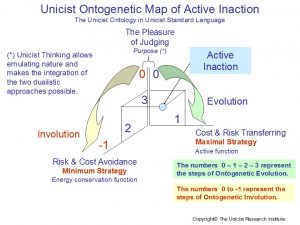Active inaction destroys relationships and businesses
Active inaction works as an “ethical business virus” that destroys any productive relationship in organizations. Active inaction is a natural defense in the case of cultures and people who are not able or willing to assume the responsibility for generating added value. It is part of the lifestyle in underdeveloped environments. See:
http://www.unicist.org/complexity-sciences/index.php/unicist-papers-search/4-human-intelligence-and-behavior/52-conceptual-structure-of-active-inaction
 A paradigmatic trigger for active inaction is “innovation blindness”. People who are affected by “innovation blindness”, need to install the virus of “active inaction” to blame others for what they cannot “see”. See:
A paradigmatic trigger for active inaction is “innovation blindness”. People who are affected by “innovation blindness”, need to install the virus of “active inaction” to blame others for what they cannot “see”. See:
http://www.unicist.org/complexity-sciences/index.php/unicist-papers-search/4-human-intelligence-and-behavior/177-conceptual-structure-of-innovation-blindness
It adopts infinite shapes that are driven by the need of avoiding responsibility for results and are sustained by the actions of transferring costs and risks to others.
As it is known, people who do not manage the concepts of what they are doing cannot know what is possible to be achieved. Therefore, they cannot assume the responsibility for producing results.
Active inaction destroys personal relationships in organizations and works as an “ethical business virus” that seeks for the destruction of the ethics of an organization. Those individuals that install this “virus” have the feeling of impunity that is sustained by the fact that “they did nothing”. See:
http://www.unicist.org/complexity-sciences/index.php/unicist-papers-search/8-business-and-institutions/179-conceptual-structure-of-business-viruses
To sustain their impunity, they seek for accomplices in order to demonstrate that their inaction is not their problem, but a problem of the organization. Through this “accomplice pact” the virus can expand instantaneously in organizations.
It needs to be clarified that inaction, in a world that is moving, is an action in itself. It is the unique action that produces an extreme friction provoking the “implosion” of what is being done and the destruction of the ethics of the organization.
All actions, with exception of the “active inaction”, can be “lubricated” in order to have a smooth productive process. It is impossible to support something that is not being done.
That is why “active inaction” is unacceptable in the business world.
Diana Belohlavek
NOTE: The Unicist Research Institute was the pioneer in using the unicist logical approach in complexity science research and became a private global decentralized leading research organization in the field of human adaptive systems. It has an academic arm and a business arm.
https://www.unicist.org/talents/wp-content/uploads/2015/10/turi.pdf
